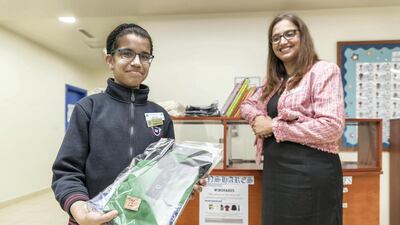As 11-year-old Mishal Faraz watched her mom quietly fold her outgrown school uniforms into a pile destined for a public donation bin, she had an epiphany.
“These were clothes in good condition,” the sixth-grade pupil said. “I thought that, ‘Would it not be better if these clothes could be passed on to children in school who can use them in the most effective way -- as school uniforms?’”
From the age of six, Mishal has been dedicated to finding new ways of conserving or recycling materials and encouraging others to do the same. Each year at her school, as a member of the environment club, she leads collection drives to recycle used batteries, paper and e-waste. As head girl of the primary section of Winchester School in Jebel Ali, Mishal often speaks to her peers about how everyone needs to play a part in protecting the earth and eliminating unnecessary waste.
So, when Mishal’s eye for environmental protection turned to her home – and, specifically the used school uniforms that she and her younger brother had outgrown -- her mom smiled and welcomed her suggestions.
“She said, ‘Give it to someone, someone who can wear it in the school,’” said her mom, Iram Rizvi. “I said, how do I find someone? So, then she started thinking, and she came up with the idea, ‘How about we have a place in school, like a box?’”
Winchester School principal Meenakshi Dahiya embraced the idea and took it one step further by replacing the collection box with two proper cabinets – one in the primary, another in the secondary school – where pupils were encouraged to drop off their gently-used school uniforms and books.
Donated clothing must be laundered, ironed, wrapped in clear plastic and clearly labelled with the size and books must be in good condition.
“When we are giving stuff, we should give it with respect,” said Ms Rizvi.
They decided to call their initiative WinShares and, in November, announced it to the entire school community. The donated books and uniforms can be collected no-strings-attached, Mishal told her peers.
“There will be no questions asked, there will be no registration, you don’t have to sign in for anything,” said Mishal. “Anyone can take anything that they need and anyone can drop anything. So what we’re doing is building a cohesive society which is also the vision of the Rulers of this nation.”
The campaign not only ensures that these items are not wasted, but they relieve some of the burden of families who may be experiencing financial challenges. A set of uniforms can cost about Dh800 annually per child, and scholastic materials and textbooks run from about Dh100 in the early years to about Dh600 in the higher grades. All those items are now also subject to 5 per cent VAT.
“It not only contributes to the environment and sustainability, but it also builds on the UAE culture of giving, and Sheikh Zayed is the epitome of always believing in giving, so she shared how he has given to the community and always thought of everybody,” said principal Meenakshi Dahiya.
Mishal, a non-resident Indian who was born in Dubai and has lived here her entire life, said she draws inspiration from the Rulers of the UAE.
“Last year they made the Year of Giving, so I was really inspired by this, so I thought that I wanted to do something, and I also wanted to pay tribute to the Year of Zayed,” said Mishal. “I want people to be aware of it and also to inspire others so that they can have similar initiatives in their schools or households.”

